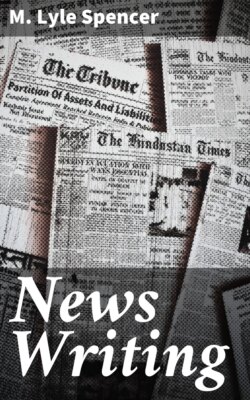Читать книгу News Writing - M. Lyle Spencer - Страница 3
На сайте Литреса книга снята с продажи.
PREFACE
ОглавлениеTable of Contents
The first week of a reporter's work is generally the most nerve-racking of his journalistic experience. Unacquainted with his associates, ignorant of his duties, embarrassed because of his ignorance, he wastes more time in useless effort, dissipates more energy in worry, and grows more despondent over his work and his career than during any month of his later years. Yet most of his depression would be unnecessary if he knew his duties.
To acquaint the prospective reporter with these duties and their proper performance is the purpose of this volume, which has been written as a practical guide for beginners in news writing. Its dominating purpose is practicalness. If it fails in this, its main purpose will be lost.
Because of this practical aim the attempt has been made to approach the work of the reporter as he will meet it on beginning his first morning's duties in the news office. After an introductory division explaining the organization of a newspaper and acquainting the beginner with his fellows and superiors in the editorial rooms, the book opens with an exposition of news. It then takes up sources of news, methods of getting stories, and the preparation of copy for the city desk.
In discussing the writing of the story, it has seemed necessary to devote much attention to the lead, experience showing that the point of greatest difficulty in handling a story lies in the choice of a proper and effectively worded lead. Likewise, it has been necessary to discuss the sentence at great length and to touch the paragraph only lightly, because the one is so much a matter of individual judgment, the other subject to such definite laws—laws of which, however, most cub reporters are grossly ignorant. In some classes in news writing the instructor will find it possible and advisable to pass hastily over the chapter on The Sentence, but as a rule he will find a careful study of it profitable. In Part III, that dealing with types of stories, emphasis has been laid on interview, crime, and sports stories, because it is these that the cub reporter must be most familiar with on taking up his work in the newspaper office. For the same practical reasons the volume omits editorial and copy reading, and makes no attempt to teach the beginner to be a dramatic critic or a city editor. It aims to give him only those details and that instruction which shall make him a competent, reliable reporter for the city editor who first employs his services.
The book is written also with the belief, based on practical experience, that news writing as a craft can be taught. It is not contended that schools can produce star reporters. The newspaper office is the only place where they can be developed. But it is maintained that the college can send to the city room men and women who have been guided beyond the discouraging defeats of mere cub reporting, just as schools of law, medicine, and commerce can graduate lawyers, doctors, and business men who know the rudiments of their professions. And this contention is based on experience. During the last four years the studies here offered have been followed closely in the class room, from which students have been graduated who are now holding positions of first rank on leading American dailies. Some too, though not all, had had no previous experience in newspaper work.
All the illustrations and exercises except two are taken from published news articles, most of the stories being unchanged. In some, however, fictitious names and addresses, for obvious reasons, have been substituted.
For aid in the preparation of this volume my thanks are due to Mr. C. O. Skinrood of The Milwaukee Journal, Mr. Warren B. Bullock of The Milwaukee Sentinel, and Mr. Paul F. Hunter of The Sheboygan Press, who have made numerous criticisms upon the book during its different stages. Their suggestions have been invaluable. For permission to reprint stories from their columns my thanks also are due to the Appleton Post, Atlanta Constitution, Boston Transcript, Chicago American, Chicago Herald, Chicago Tribune, Des Moines Register, Indianapolis News, Kansas City Star, Los Angeles Times, Milwaukee Journal, Milwaukee Sentinel, Minneapolis Tribune, New York Herald, New York Sun, New York Times, New York Tribune, New York World, Omaha News, Philadelphia Public Ledger, and the Washington Post.
M. L. S
Appleton, Wisconsin
March 12, 1917
